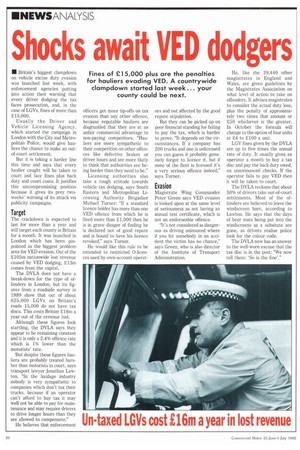Shocks await VED dodgers
Page 24

If you've noticed an error in this article please click here to report it so we can fix it.
Fines of £15,000 plus are the penalties for hauliers evading VED. A countrywide clampdown started last week.., your county could be next.
• Britain's biggest clampdown on vehicle excise duty evasion was launched last week, with enforcement agencies putting into action their warning that every driver dodging the tax faces prosecution, and, in the case of LGVs, fines of more than £15,000.
Usually the Driver and Vehicle Licensing Agency, which started the campaign in London with the City and Metropolitan Police, would give hauliers the chance to make an outof-court settlement.
But it is taking a harder line this time and says that every haulier caught will be taken to court and face fines plus back duty and court costs. It justifies this uncompromising position because it gives its prey twoweeks' warning of its attack via publicity campaigns.
Target
The crackdown is expected to last for more than a year and will target each county in Britain for a month. It was launched in London which has been pinpointed as the biggest problem area for VED evasion. Out of the £105m nationwide lost revenue caused by VED dodging, £13m comes from the capital.
The DVLA does not have a break-down for the type of offenders in London, but its figures from a roadside survey in 1989 show that out of about 625,000 LGVs on Britain's roads 15,000 do not have tax discs. This costs Britain 216m a year out of the revenue lost.
Although these figures look startling, the DVLA says they appear to be remaining constant and it is only a 2.4% offence rate which is 1% lower than the motorists' rate.
But despite these figures hauliers are probably treated harsher than motorists in court, says transport lawyer Jonathan Lawton. "In the haulage industry nobody is very sympathetic to companies which don't tax their trucks, because if an operator can't afford to buy tax it may well not be able to pay for maintenance and may require drivers to drive longer hours than they are allowed to compensate."
He believes that enforcement officers get more tip-offs on tax evasion than any other offence, because reputable hauliers are disgruntled that they are at an unfair commercial advantage to non-paying competitors. "Hauliers are more sympathetic to their competition on other offences like defective brakes or driver hours and are more likely to think that authorities are being harder than they need to be."
Licensing authorities also take a tough attitude towards vehicle tax dodging, says South Eastern and Metropolitan Licensing Authority Brigadier Michael Turner: "If a standard licence holder has more than one VED offence from which he is fined more than £1,000 then he is in grave danger of finding he is declared not of good repute and is bound to have his licence revoked," says Turner.
He would like this rule to be extended to restricted 0-licences used by own-account operat ors and not affected by the good repute stipulation.
But they can be picked up on poor financial standing for failing to pay the tax, which is harder to prove. "It depends on the circumstances. If a company has 200 trucks and one is unlicensed you can guess it probably genuinely forgot to licence it, but if none of the fleet is licensed it's a very serious offence indeed," says Turner.
Evasion
Magistrate Wing Commander Peter Green says VED evasion is looked upon at the same level of seriousness as not having an annual test certificate, which is not an endorseable offence.
"It's not considered as dangerous as driving uninsured where if you hit somebody in an accident the victim has no chance," says Green, who is also director of the Institute of Transport Administration. He, like the 29,440 other magistrates in England and Wales, are given guidelines by the Magistrates Association on what level of action to take on offenders. It advises magistrates to consider the actual duty loss, plus the penalty of approximately two times that amount or £50 whichever is the greater. In October the formula will change to the option of four units at £4 to £100 a unit.
LGV fines given by the DVLA are up to five times the annual rate of duty. It usually gives an operator a month to buy a tax disc and pay the back duty owed, on unannounced checks. If the operator fails to pay VED then it will be taken to court.
The DVLA reckons that about 50% of drivers take out-of-court settlements. Most of the offenders are believed to leave the windscreen bare, according to Lawton. lie says that the days of beer mats being put into the windscreens as a subsitute are gone, as drivers realise police look for the colour code.
The DVLA now has an answer to the well-worn excuse that the tax disc is in the post: "We now tell them: 'So is the fine'."














































































